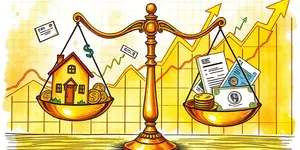
Owning a home is both an achievement and a financial responsibility. When extra income arrives, a profound question emerges: should you deploy that money to extinguish your mortgage sooner, or plant it into investments that may flourish over time?
At its heart, this decision balances the comfort of knowing your payments end early against the excitement of higher average historical returns. Extra mortgage payments provide a guaranteed risk-free return, equal to your loan’s interest rate. In contrast, investing in stocks, bonds, or retirement accounts can yield long-term wealth potential—but never with absolute certainty.
Imagine you have $100,000 in spare funds. You could apply it to a 3.5% mortgage, saving roughly $20,270 in interest over ten years. Alternatively, you might invest the same amount expecting a 5% annual return, potentially generating about $62,889 in gains across a decade. Which path resonates with your goals, risk appetite, and peace of mind?
Investopedia and financial research consistently highlight that US equities have returned around 10% annually over the long term. Yet, these gains come with volatility. On the flip side, a fixed mortgage rate—say 5%—yields a rock-solid return by avoiding equivalent interest payments.
When your anticipated average investment return exceeds your mortgage rate, investing extra cash can accelerate net worth growth. But if markets slump unexpectedly, you may feel the sting of lost gains, whereas a mortgage payment always delivers full value.
Paying down your mortgage offers absolute certainty and complete control. You know exactly how much interest you’ll avoid, and you steadily build equity. There is no market risk, no late-night worries about volatility. Many homeowners cherish the peace of mind from debt freedom—a psychological benefit often overlooked in raw calculations.
Conversely, investing taps into compounding magic. A disciplined investor who contributes $10,000 annually at a 7% return might accumulate about $157,836 over ten years. This can dramatically outpace mortgage savings, but requires patience and the stomach for market cycles.
In past decades, mortgage interest deductions provided extra incentive to carry debt. Today’s higher standard deductions mean fewer taxpayers itemize, reducing that benefit for many. When you pay off a 6% loan in a 28% bracket, your after-tax savings approach 4.32%. Still, this is a meaningful guaranteed yield—especially compared to after-tax investment returns that can be eroded by capital gains taxes.
Liquidity matters too. Funds committed to your home are less accessible than investments in brokerage or retirement accounts. While home equity lines exist, tapping them reintroduces interest costs and paperwork delays. If an emergency appears, having money in liquid assets provides rapid financial flexibility.
No single formula fits everyone, but a clear checklist can illuminate your path:
By methodically weighing these factors, you can align your choice with your financial and emotional priorities.
Scenario A: Your mortgage rate is 4.5%. You invest $50,000 at 6% for 15 years. At 6%, your investment grows to roughly $120,612. By contrast, the mortgage payoff saves about $44,008 in interest. The investment path appears superior, but only if that 6% return materializes and persists.
Scenario B: You have a 7% mortgage acquired in a rising rate environment. The same $50,000 paid down today avoids nearly $59,569 in future interest at a guaranteed rate. Few market strategies can reliably surpass 7% after taxes without significant risk.
Your journey toward financial freedom is uniquely yours. Balancing the certain benefit of early payoff with the potential of market growth requires clarity, courage, and self-awareness. There is no universal ‘winner,’ only the option that best suits your risk profile, tax situation, and life ambitions.
Whether you champion the relief of a paid-off mortgage or the excitement of compounding investments, commit to a plan, revisit it annually, and adjust as life evolves. In doing so, you’ll not only grow your wealth but also cultivate confidence in your financial decisions and the peace of mind that comes with true mastery over your mortgage and investments.
References













